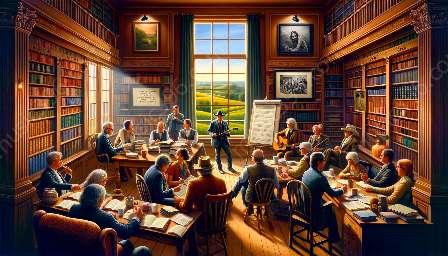Country music has played a significant role in influencing social movements and protest culture throughout history. Its evocative themes and storytelling have provided a powerful platform for expressing societal issues, generating empathy, and fostering a sense of unity among diverse communities. This topic cluster delves into the impact of country music on society, examining its historical and contemporary relevance, cultural significance, and transformative role in shaping social consciousness and activism.
The Historical Roots of Country Music's Influence
Country music's influence on social movements can be traced back to its historical origins in the rural American South. Emerging in the early 20th century, country music reflected the struggles and experiences of working-class individuals, addressing themes such as poverty, labor rights, and racial discrimination. During this period, the genre served as a medium for marginalized communities to voice their grievances and assert their cultural identity, laying the groundwork for future social and political movements.
Cultural Significance and Reflective Storytelling
Country music's ability to reflect real-life narratives and experiences has made it a compelling force in addressing social issues and advocating for change. Through poignant lyrics and emotional melodies, country artists have addressed topics such as civil rights, economic inequality, and environmental activism. The genre's authenticity and relatability have resonated with audiences, fostering a deep emotional connection and inspiring individuals to engage with social and political causes.
Case Studies of Country Music's Impact on Social Movements
- The Civil Rights Movement: Country music played a pivotal role in amplifying the voices of activists and advocating for racial equality during the Civil Rights Movement of the 1960s. Artists like Johnny Cash and Merle Haggard used their platforms to address issues of segregation, injustice, and solidarity, contributing to the movement's momentum and galvanizing public support.
- Protest Culture and Anti-War Movements: Country music became a catalyst for anti-war sentiments and protest culture, particularly during the Vietnam War era. Icons like Willie Nelson and Kris Kristofferson voiced opposition to war and governmental policies through their music, aligning with the sentiments of a generation seeking social change and peace.
- Modern Social and Environmental Advocacy: In contemporary times, country music continues to influence social movements and protest culture by addressing contemporary issues such as climate change, immigration reform, and mental health awareness. Artists like Kacey Musgraves and Brandi Carlile have used their platforms to advocate for societal change and promote inclusivity and empathy.
Cross-Generational Impact and Transformative Potential
Country music's enduring influence on social movements transcends generational boundaries, resonating with diverse audiences and perpetuating a legacy of progressive activism. Its capacity to bridge cultural divides, evoke empathy, and empower individuals to advocate for positive social change has solidified its position as a catalyst for societal transformation and reflection.
Conclusion
Country music's influence on social movements and protest culture is a testament to its enduring relevance and transformative power. From addressing historical injustices to advocating for contemporary societal issues, the genre has served as a beacon of cultural expression and a catalyst for positive change. By amplifying diverse voices and fostering solidarity, country music continues to shape and reflect societal movements, inspiring empathy, understanding, and collective action.























